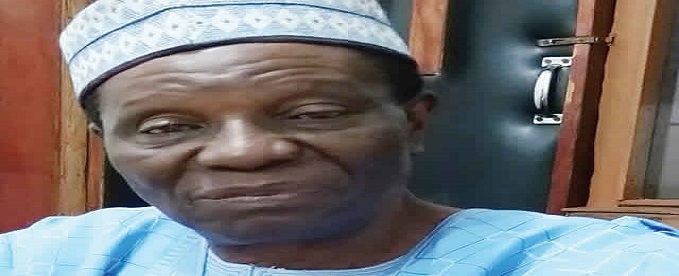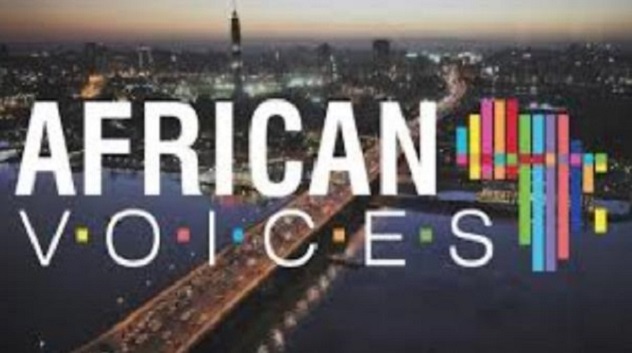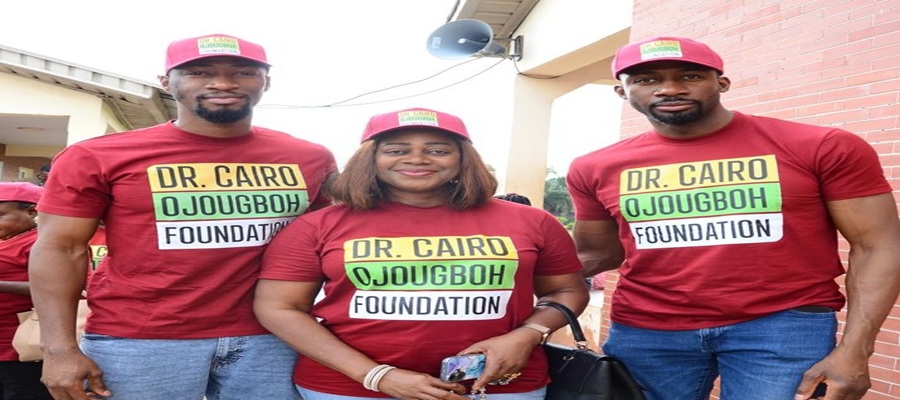Broadcasting
Hate Speech: DSS Is Better Than NBC

By Tonnie 0. Iredia
History tell us that in most heterogeneous societies, multiple centrifugal forces make it easy for the fragile fabric that binds society together to give way at the slightest provocation.

To avoid the dismemberment of such societies therefore the remedy is to always pursue policies that can unite the different groups that make-up any such society.
Nigeria is a good example of a nation whose constituents have for long been restive about what many see as basic inequality in the management of public affairs.
This has over the years tended to accentuate ethno-religious intolerance compelling government to rely more on prescriptive criteria than merit in many policies.
Under the circumstance, Nigerian leaders have found it expedient to take steps to consciously dissuade the use of intemperate language that can inflame passion and cause anarchy in society.
But this has to be done without encroaching on the fundamental principle of freedom of expression which democracy guarantees.
According to Section 39, of the Nigerian Constitution 1999, “every person shall be entitled to freedom of expression including freedom to hold opinions and to receive and impart ideas and information without interference.”
However, Section 45 of the same constitution makes it clear that freedom of expression must not be used to make reckless statements that can adversely affect other persons.
In other words, government has a duty to ensure that laws such as that on defamation are made to protect the rights of other citizens. Bearing in mind that the mass media have the capacity of disseminating information far and wide, the conduct of the media has to be regulated to avoid disseminating insensitive materials that can pitch one group of society against the other.
Therefore, a regulation such as the National Broadcasting Code which among other things, seeks to prohibit fake news and hate speech that are injurious to society is tolerable, provided, it is neither politicized nor used for witch-hunting.
Put differently, no regulation should be negatively constructed to become a fault-finding tool or an instrument to gag the media.
On Monday, August 10, 2020, a former Deputy Governor of the Central Bank who is currently a Directing Staff at Nigeria’s authoritative Policy Research Institute in Kuru, Jos, Dr. Obadiah Mailafia while participating in a radio programme alleged that a serving Nigerian state governor was one of the commanders of the dreaded Boko Haram group.
In the reported words of Mailafia, “some of us also have our intelligence networks. I have met with some of the bandits; we have met with some of their high commanders – one or two who have repented – they have sat down with us not once, not twice. They told us that one of the northern governors is the commander of Boko Haram in Nigeria.”
As was expected, two relevant Nigerian Agencies, the Department of State Services, DSS and the broadcast regulator, the Nigerian Broadcasting Commission, NBC quickly reacted to the subject.
While the DSS invited Mailafia for questioning with a view to extracting more facts on the authenticity of his claims, the NBC examined the broadcast against the backdrop of its mandate to ensure that no broadcast station is used to undermine the continued existence of the country.
The two agencies have since made a number of declarations on the subject. On its part, the NBC, instantly found the radio station, Nigeria Info 99.3 guilty of what it called “unprofessional broadcast” and imposed a fine of N5 million on the station.
In the case of the DSS, the conclusion arrived at was that it was indecent on the part of Mailafia to have disseminated such information without using his well-connected links in society to verify the heavy allegations before making them public. Thereafter the DSS warned all highly-placed citizens to show greater restraint in their public utterances.
Before reaching her conclusion, the DSS invited Mailafia twice for interrogation thereby giving him ample opportunity to defend himself.
When compared with the summary trial which the NBC gave to the Nigeria Info radio station, it is obvious that at least on this matter, the DSS has been more humane than the broadcast regulator. Although the DSS has all the instruments of coercion at her disposal, she was not coercive. Indeed, Mailafia’s lawyer testified that the service was civil in her conduct with his client.
Many people particularly broadcasters, this writer inclusive, have since remained baffled by the speed with which the broadcast regulator found the radio station guilty of “unprofessional conduct” in its transmission.
First, the interview was organized by the station on one of its regular slots – ‘Morning CrossFire’ where different personalities are invited to air views on burning issues, in which case it was a normal programme which had no trappings of mischief.
Second, the guest was by every standard, a first-class political news maker, capable of throwing light on issues of public interest being a bonafide Nigerian political leader who would have been our President if the party which sponsored him as a Presidential candidate had won last year’s Presidential elections.
Third, the programme was a LIVE broadcast that could not have been subjected to editorial control unlike a recorded programme that could be edited to remove unwanted portions.
Fourth, following global realities in broadcasting, LIVE programming is today the new trend making it untenable to question the format and philosophy of Morning CrossFire.
Based on the above, we think the NBC’s posture is not a plus to society just as it cannot improve the broadcasting profession in Nigeria. Rather, the huge fine on a purported offence, could only have instilled fear in broadcasters to now embrace self-censorship and timidity.
The NBC needs to move away and very quickly too, from that old perception of radio as an organ for telling the people what the government wants them to hear. Public expectations of the media in society have since gone beyond that narrow prism.
Today, the media is expected to undertake a surveillance of the environment, while monitoring the process of governance as mandated by Section 22 of the Nigerian Constitution. It is also to serve as a link between the government and the people; as well as criticize and analyze events.
More importantly, the media is not only to inform the people but also to protect their rights to know while at the same time pointing out danger signals in the horizon for people to avert a woeful end.
As heavy as Mailafia’s allegation appears to be, there is no conclusive proof that it is false just as the allegation is neither different nor heavier than the old unproved belief that Boko Haram was founded by a governor.
The intelligence services should therefore see Mailafia’s addition as a new vista for understanding the advent and growth of insurgency and how to bring it to a peaceful end in our country.
Electioneering campaigns going on in Edo State at the moment, are replete with hate speeches thereby confirming that the greatest culprit of hate speech is the political class.
We cannot make progress if offending politicians receive sermons only while the media, they use are heavily penalized by a regulator, whose component parts – Minister, Board and Management are singing discordant tunes.
—Iredia is former DG, Nigerian Television Authority (NTA)
Broadcasting
Pheelz Shares His Journey on Glo-Sponsored African Voices

Nigerian singer, songwriter and producer Pheelz (Phillips Kayode Moses) is set to feature this weekend on African Voices Changemakers, the flagship magazine programme on CNN International.

The 30-minute episode, sponsored by digital solutions company Globacom, premieres on Saturday, February 21, 2026. In a candid sit-down with host Larry Madowo, Pheelz opens up about his journey from church musician to global hitmaker, reflecting on the intersections of faith, fame and the expanding influence of Afrobeats on the world stage.
Now 31, Pheelz began his musical path as a multi-instrumentalist in church before earning widespread acclaim in 2012 as the producer behind the hit tracks “First of All” and “Fucking with the Devil” on Olamide’s YBNL album. His rapid rise saw him named among NotJustOk’s Top 10 Hottest Producers in Nigeria in 2013.
He further solidified his reputation by producing nearly every track on Olamide’s Baddest Guy Ever Liveth, earning nominations at The Headies 2013 and in the Producer of the Year category at both The Headies 2014 and the Nigeria Entertainment Awards. In 2020, he clinched The Headies Producer of the Year award, and in 2021 secured the Soundcity MVP Award for Best Collaboration for “Finesse,” his smash hit with Bnxn (formerly Buju).
On the programme, Pheelz reflects on the experiences that shaped his sound and creative philosophy, discusses landmark collaborations, shares his perspective on artificial intelligence and artistry, and explains why sound, storytelling and culture remain central to African music’s global resonance.
The show airs on DSTV Channel 401 at 8:30 a.m. (WAT) on Saturday, with repeat broadcasts at 12:00 noon the same day; Sunday at 4:30 a.m. and 7:00 p.m.; Monday at 4:00 a.m. and 6:45 p.m.; and Tuesday at 6:45 p.m. The broadcast schedule continues through Monday of the following week.
Broadcasting
Dr. Cairo Ojougboh Foundation Bolsters Nigeria’s Education Drive with ₦2.7m Student Support

Dr. Cairo Ojougboh Foundation has reinforced government’s educational development efforts in Nigeria through a targeted initiative honouring the late medical doctor and House of Representatives member, Dr. Cairo Ojougboh.

L-R: Son of the late Dr, Cairo Ojougboh, Mr. Nkem Ojougboh; Chairperson, Dr. Cairo Ojougboh Foundation, Mrs. Bose Ojougboh and another son, Mr. Orieka Ojougboh, during the event in Agbor, Delta State recently.
The foundation recently hosted a programme themed “Your Future, Your Choice” at St. Columba’s Grammar School in Agbor, headquarters of Ika South Local Government Area, Delta State.
It presented a cheque of ₦2,700,000 to cover examination fees for students preparing for West African Examinations Council (WAEC), National Examinations Council (NECO), and Junior Secondary School (JSS) 3 exams.
Academic excellence received further boosts with cash rewards for top students across the school’s nine academic arms, alongside distributions of notebooks and writing materials to enhance learning.
Chairperson Mrs. Bose Ojougboh, joined by her sons Mr. Nkem and Mr. Orieka Ojougboh, urged students to view challenges as stepping stones, embrace discipline, consistency, and focus, and make intentional choices shaping their futures.
“The school that moulded Dr. Cairo’s values deserves our support,” she said, highlighting the foundation’s commitment to inspiring hard work and personal growth.
Old Boys of St. Columba’s Grammar School, led by Elder Ndudi Agholor, attended in force, sharing nostalgic reflections and praising the school’s sustained high standards under current leadership.
School Principal Rev. Fr. Joseph Ugboh and Ika South LGA Chairman Engr. Jerry Ehiwarior lauded the initiative as “commendable and impactful,” calling for its continuation to preserve Dr. Ojougboh’s legacy of discipline, excellence, and service.
They noted the support had motivated students to pursue their goals with renewed determination, ending the event on a hopeful note.
Broadcasting
New Horizons Nigeria Breaks Ground: First to Fuse Mandarin into ICT Curriculum

In a landmark educational innovation, New Horizons Nigeria has become the first institution to integrate the Chinese (Mandarin) language into its ICT curricular as an elective, thereby positioning Nigerian students for relevance in the rapidly changing world order.

Mr. Tim Akano, Managing Director and CEO of New Horizons Systems Solutions Limited
New Horizons Nigeria is a leading ICT training and solutions provider committed to provide individuals and institutions with future-ready skills. Through innovative program, global partnerships, and strategic foresight, the organization continues to redefine education, workforce development, and global competitiveness.
With over 80% of global consumer products manufactured in China and China’s growing dominance in global supply chains and labour markets, New Horizons Nigeria recognizes the urgent need for the current generation to understand, speak, and engage with the Chinese language and culture. As global economic power dynamics evolve, the labour market is increasingly tilting towards China, making Mandarin proficiency a critical competitive advantage.
According to Mr. Tim Akano, Managing Director and CEO of New Horizons Systems Solutions Limited, Nigeria, the program represents far more than a language course.
He asserted that very soon, the global labour market is likely to increasingly reflect China’s influence rather than the predominantly western orientation it currently exhibits. Language will be a major differentiator and the first Chinese-speaking technology experts in Nigeria will have a significant advantage, especially in integration into Chinese companies operating locally and globally.
Therefore, New Horizons Nigeria has officially launched a Mandarin Scholarship Program with China Advancement Opportunity, selecting 100 outstanding students from five prominent Nigerian secondary schools. This initiative marks a major milestone in Nigeria–China educational cooperation and reflects a forward-thinking response to shifting global economic realities.
Furthermore, the scholarship program has commenced with an intensive three-month online Mandarin training and at the end of the program, the top-performing students will be selected strictly on merit. 20 outstanding students will receive an additional scholarship valued at $2,500 per students to participate in a one-year pre-degree Mandarin and cultural immersion program in China. From this group, the best candidates will progress to fully funded admission scholarships into top universities in China. This initiative is designed not only to build language proficiency but also to enhance global competence, international exposure, and cultural intelligence among Nigerian students.
Also, to maintain international academic standards, participating schools are required to comply with strict guidelines. They will be obligated to join the online classes ten minutes earlier, they must have a minimum of 85% attendance throughout the program, and must ensure they have a stable internet connectivity, reliable power supply and a conducive learning environment.
Therefore, School owners and administrators have been formally congratulated and strongly encouraged to nominate their most disciplined, and committed students, as advancement to the China program will be strictly merit-based.
However, apart from students, internation business men are equally encouraged to attend New Horizon’s Mandarin executive lessons which will equip them with basic Chinese language to enhance their business communications.
Additionally, while the pilot phase begins with selected secondary schools which includes Startrite School, Lightway School, British Nigerian Academy School, Honeyland Schools and Great Heights School, the Mandarin program will be available as an elective ICT course at all New Horizons retail centers.
This is done to extend access to students and learners beyond its partner schools and within one year, committed learners will be able to communicate effectively in Mandarin, which will open doors to global employment, trade, and cultural exchange.
In conclusion, a Mandarin Cultural Fiesta will be hosted, bringing together educators, students, institutional partners, and distinguished guests from China and Nigeria. The event will celebrate outstanding performance, cross-cultural exchange, and the strengthening of bilateral educational ties.
For enquiries and participation details, interested individuals are encouraged to contact New Horizons Nigeria via 08125541750

 Telecom2 days ago
Telecom2 days agoBanks, Telcos Settle Four-Year Dispute over N300Bn USSD Debt

 E-Financial2 days ago
E-Financial2 days agoACAMB Educates Content Creator to Curb Misinformation on Bank Recapitalisation

 General News1 day ago
General News1 day agoHow JustMarkets Is Empowering African Traders with Global Market Access

 General News2 days ago
General News2 days agoPalmPay Unveils First Batch of Winners in #LoveWithPalmPay Campaign

 Telecom1 day ago
Telecom1 day agoGroup Condemns Gabon’s Social Media Shutdown Amid Protests

 E-Financial2 days ago
E-Financial2 days agoFirstCap MD says Payment Security Remains Biggest Barrier to Bankable Gas and Power Projects

 General News2 days ago
General News2 days agoCourt Freezes MCSN Copyright Levies amid Record Label Legal Battle

 E-Business1 day ago
E-Business1 day agoMutual Benefits Assurance Settles ₦5.9bn Claims in January 2026
























